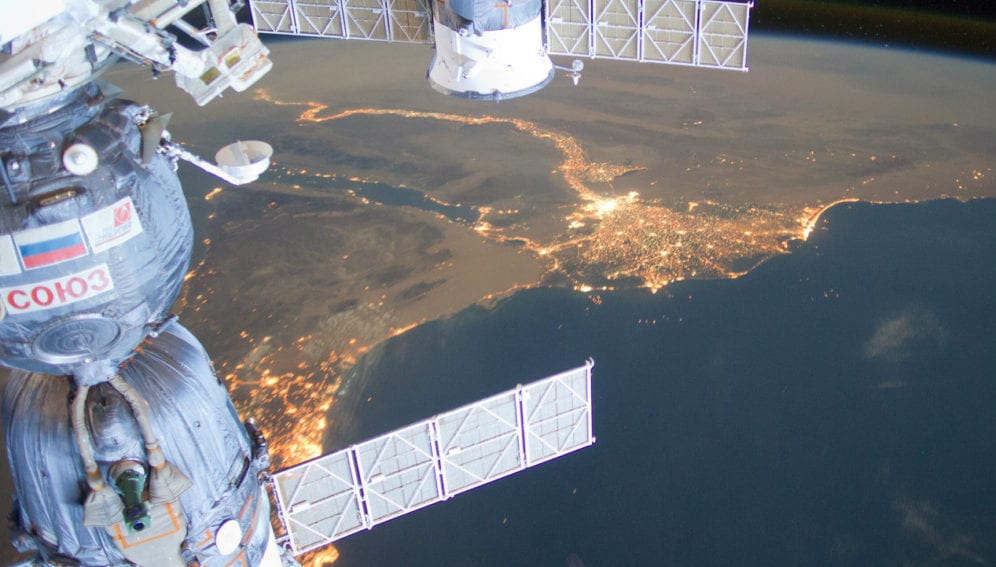By: Wagdy Sawahel
Send to a friend
The details you provide on this page will not be used to send unsolicited email, and will not be sold to a 3rd party. See privacy policy.
[CAIRO] Egypt plans to launch its second satellite for scientific research and establish a new space authority and national space agency as well as work with other African states to pave the way for a new African space agency.
But some experts have warned that the aspirations may exceed Egypt’s financial and human resources, and that the country is rushing to launch a new satellite despite having learnt little from the loss of its first one in 2010 after just three years of operation.
The planned satellite, called EgyptSat 2, will be manufactured, assembled and tested in Egypt, Mohamed Medhat Mokhtar, chair of the National Authority for Remote Sensing and Space Sciences (NARSS), Cairo, tells SciDev.Net.
“The design phase has been running for ten months successfully using Egyptian expertise,” Mokhtar says. “An expert foreign partner will join at the end of this phase to review and approve the outcome of the design phase, and hence support the activities of the next phases.”
Belal El-Leithy, the manager of NARSS’s earth observation ground receiving station, says: “Sat 2 will use modern technology to acquire images for uses in several sectors, including agricultural, geological and environmental applications and research. We hope to be ready to launch Sat 2 in about three years.”
Egypt launched its first satellite in 2007 but some critics argue that the country has done little to retain its expertise in this area.
“We have lost most of the engineers we have trained in the EgyptSat 1 programme, as some went to [work in] refrigerator factories and others left the engineering field completely,” says Ayman Hamdy Kassem, professor of aerospace engineering at Cairo University and a member of the research and training team for the EgyptSat 1 satellite project.
“Sat 2 will use modern technology to acquire images for uses in several sectors.”
Belal El-Leithy, NARSS
Echoing Kassem’s views, Farouk El-Baz, director of the Center for Remote Sensing at Boston University, United States, tells SciDev.Net that EgyptSat 1’s short life discouraged similar projects.
“They lost communication with the satellite and had no idea why. So no one learned a thing from the loss,” he says.
Because the satellite was designed abroad, in Ukraine, Egyptian scientists and engineers were not fully trained in its design or monitoring, says El-Baz.
“Thus, it was basically a loss for Egypt because it was not part of a long-term programme to place Egypt onto a space research track.”
But El-Leithy maintains that EgyptSat 1 was an experimental satellite that was only designed to operate for three years with full performance, which, he says, it did, providing many useful images for Egypt and its neighbours.
“Countries all over the world lose control over satellites all the time, as this type of industry is risky because it operates in a harsh environment,” he says.
“The problem,” he adds, “is when you let one incident stop your progress and waste your gained technological expertise and your trained scientific workforces.”
Beyond satellites
Egypt is also planning to establish two new space bodies. The Egyptian Space Authority would be responsible for space technology activities, including the research, design, manufacture, assembly and testing of satellites.
And Egypt’s interim president is said to be reviewing a proposal to set up a national space agency.
“The state space agency of Egypt will be an independent entity and will directly answer to the presidency of Egypt,” Mokhtar says.
The agency would organise and govern Egypt’s space activities, aiming to stimulate the national economy, and cooperate with similar regional and international entities on sustainable development initiatives, he says.
Mokhtar adds that Egypt is working with other African states, including Algeria and South Africa, on preparing policies and strategies to establish the first African space agency under the continental coordination of African union commission.
El-Baz says the national space agency could help “infuse a spirit of science excellence” in the present day NARSS, which, he says, is poorly funded and has no clear objectives.
But Kassem is highly sceptical that the agency will take off in the near future because of a lack of funding and trained personnel.














